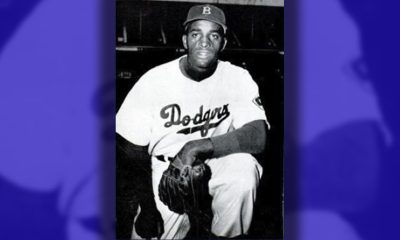National
Rape and the Myth of ‘The Strong Black Woman’
By Jazelle Hunt
NNPA Washington Correspondent
A woman is raped every 2 minutes in the United States. According to the U.S. Justice Department, nearly one of every five Black women – 19 percent – are raped each year. Many experts suspect those figures severely understate the problem. For example, research by the Black Women’s Blueprint, Inc., a New York City-based civil and human rights organization of women and men, reports that 60 percent of Black women have been sexually assaulted by the time they are 18 years old.
Whatever the actual number, too often, the victims – including a surprising number of males and young girls – suffer alone. Efforts to discuss the abuse are usually met with disbelief or a feeling that such behavior should be quietly swept under the rug, as though ignoring the problem will magically make it disappear.
As a matter of policy, news organizations generally withhold the names of rape victims. But Black women in particular are beginning to break this silence, bravely coming out of the shadows to publicly reveal their names and faces and share their painful stories in hopes of exposing and ending this all-too-common violence. This series by NNPA Washington Correspondent Jazelle Hunt examines rape in the Black community and the long path toward healing.
WASHINGTON (NNPA) – For 20 years, Sharita J. Lee was numb. She did not cry. She did not love the men she dated. The only emotion she could muster was rage.
But she recently caught wind of the storm of sexual assault allegations involving Bill Cosby, America’s favorite TV dad. One by one, more than 30 women lodged charges against the comedian, some dating back 45 years. And one by one, their revelations were met with skepticism, personal attacks on the accusers, and even outright scorn.
“Until then, I had thought about [my assault], but I didn’t have any emotion about it,” Lee recalled. “I wouldn’t have felt anything until I read that article,” Lee said.
After reading the article about comedian Hannibal Buress’ jab at Bill Cosby, Lee scrolled to the comments section. She couldn’t believe how many people questioned why these women were coming forward decades later. Appalled, she opened her laptop, and penned all the gory details of her rape and its aftermath for the world to see. Her account was published on a blog just before Christmas.
The topic of rape has not only been revived by the controversy surrounding Bill Cosby but also by misbehavior in other segments of society. For example, dozens of high-ranking military officers have been fired for rape or having inappropriate sexual affairs with women within and outside their command.
Rape on college campuses has received wider coverage following a series of high-profile campus rapes, including one at the United States Military Academy at West Point. The Department of Education announced last May that it is investigating 55 colleges for mishandling complaints of sexual violence, a figure that has since risen to 90.
Last week, two Vanderbilt University football players were found guilty of raping an unconscious fellow co-ed and two more former football players are awaiting trial. And
Florida State quarterback Jameis Winston, a former Heisman Trophy winner, has been dogged for more than a year amid allegations that he raped a FSU student in December 2012; an attorney for the student announced plans to sue the university.
Most Americans do not know as much about rape as they think.
According to the Department of Justice:
• Somewhere in America, a woman is raped every 2 minutes;
• 22 percent of victims were younger than age 12 when they were first raped, and 32 percent were between the ages of 12 and 17;
• 25 percent of girls and 17 percent of boys are sexually abused before the age of 18;
• 70 percent of rape and sexual assault victims know their attacker prior to the assault and
• Of college women questioned, about 90 percent of rape and sexual assault victims knew their attacker prior to the assault.
It took Sharita Lee close to two decades to truly break her silence.
Two decades ago, she was a 20-year-old New Orleans native serving her country as a member of the U.S. Navy. She had joined the military to distance herself from home, where her stepfather physically abused her mother, who was battling alcoholism.
But she returned to New Orleans immediately when she learned her grandfather was on his deathbed. During her visit, she ran into a childhood friend at her uncle’s house, and the two caught up. A few hours passed as they laughed and reminisced on the couch. Then, Lee got the call that her grandfather had died.
Abruptly, in the middle of condolences and small talk, he lunged at her. In a fluid flurry, he grabbed her legs and pulled her toward him. He pinned her knees to her chest. She shoved him. Unmoved, he yanked the back of her pants up to her thighs. He was a foot taller and outweighed her by 100 pounds. She was stunned.
“I would’ve never thought, prior to that moment, that that was something he had done before, but it happened so fast,” she said. “I couldn’t even say ‘what happened,’ I just felt him go in. In my mind I’m thinking, ‘Wow, is this happening, are you serious?’”
Afterward he got up, apologized, kissed her, and left. She didn’t move. She couldn’t speak. When he was gone, she got up, cleaned up, and cried. Then she carried on as if nothing had happened.
“Every time I think of my grandfather, that comes to mind,” she says. “My grandfather died, but I was supposed to go and see him that night. And I didn’t go because I was dealing with my friend. And that friend raped me. It’s like, oh my God, if I had been where I was supposed to be – you know, all the would’ve, should’ve, could’ves.”
‘I realized I hit rock bottom’
At the time, Lee told exactly one person: her then-boyfriend, when he came to visit her on the Navy base after her grandfather’s funeral.
“He responded by calling me a whore. He said I invited it, and cheated on him, purposely,” Lee recounted. They argued all night and ended the relationship. The reaction pushed her into stoic silence. “I never told anyone else,” she said. “That was the first time I actually went that far, and for his reaction to be the way it was…I felt humiliated but I also felt unworthy.”
Slowly, she lost her bearings.
“I became very promiscuous. I put myself in the mind of a man. However they thought that they could handle a woman, is how I began to handle them,” she says. “I know I was angry and bitter for some time. I was drinking a lot – try to couple that with being in the military – and I was having sex a lot.”
Her pain hardened to numbness, then curdled into a bad temper, worsening as years slipped by and hardship bubbled up. There was the birth of her first child and a young and unhappy marriage and then divorce at 25.
“I was 28 when I first sought therapy. I went for depression, because my brother was murdered. I was having anxiety attacks, but I couldn’t cry over it,” said Lee. “I realized I’d hit rock bottom in my emotions, or lack thereof. I knew I was to my limit with not dealing with anything.”
The Path to Healing
Today, Lee is the only person in her immediate family who has sought professional help as part of dealing with her trauma.
“People are afraid to go to therapy – my mom is afraid, in my opinion, that she is going to hear the absolute truth. It’s facing your truth, I think, that’s hard for people.
“… The biggest thing for me was allowing myself to deal with whatever hurts I had buried. I had to have healing in my own home. I told my husband and my sister things…I’m not a writer, but I wrote…dealing with my mother, stepfather, and my father, writing letters to them…. As time went, I felt better,” Lee says.
“It’s like, OK, I was raped. But as I get older and realize it’s affecting my relationships…what are you going to do to change it? You have to go find help for that. Because ultimately, you’re a prisoner in your own mind, and in your own heart.”
NEXT WEEK: Rape’s other victims
(The project was made possible by a grant from the National Health Journalism Fellowship, a program of the University of Southern California Annenberg School for Communication and Journalism.)
###
Activism
Oakland Post: Week of December 31, 2025 – January 6, 2026
The printed Weekly Edition of the Oakland Post: Week of – December 31, 2025 – January 6, 2026

To enlarge your view of this issue, use the slider, magnifying glass icon or full page icon in the lower right corner of the browser window.
Activism
2025 in Review: Seven Questions for Assemblymember Lori Wilson — Advocate for Equity, the Environment, and More
Her rise has also included several historic firsts: she is the only Black woman ever appointed to lead the influential Assembly Transportation Committee, and the first freshman legislator elected Chair of the California Legislative Black Caucus. She has also been a vocal advocate for vulnerable communities, becoming the first California legislator to publicly discuss being the parent of a transgender child — an act of visibility that has helped advanced representation at a time when political tensions related to social issues and culture have intensified.

By Edward Henderson, California Black Media
Assemblymember Lori D. Wilson (D-Suisun City) joined the California Legislature in 2022 after making history as Solano County’s first Black female mayor, bringing with her a track record of fiscal discipline, community investment, and inclusive leadership.
She represents the state’s 11th Assembly District, which spans Solano County and portions of Contra Costa and Sacramento Counties.
Her rise has also included several historic firsts: she is the only Black woman ever appointed to lead the influential Assembly Transportation Committee, and the first freshman legislator elected Chair of the California Legislative Black Caucus. She has also been a vocal advocate for vulnerable communities, becoming the first California legislator to publicly discuss being the parent of a transgender child — an act of visibility that has helped advanced representation at a time when political tensions related to social issues and culture have intensified.
California Black Media spoke with Wilson about her successes and disappointments this year and her outlook for 2026.
What stands out as your most important achievement this year?
Getting SB 237 passed in the Assembly. I had the opportunity to co-lead a diverse workgroup of colleagues, spanning a wide range of ideological perspectives on environmental issues.
How did your leadership contribute to improving the lives of Black Californians this year?
The Black Caucus concentrated on the Road to Repair package and prioritized passing a crucial bill that remained incomplete during my time as chair, which establishes a process for identifying descendants of enslaved people for benefit eligibility.
What frustrated you the most this year?
The lack of progress made on getting Prop 4 funds allocated to socially disadvantaged farmers. This delay has real consequences. These farmers have been waiting for essential support that was promised. Watching the process stall, despite the clear need and clear intent of the voters, has been deeply frustrating and reinforces how much work remains to make our systems more responsive and equitable.
What inspired you the most this year?
The resilience of Californians persists despite the unprecedented attacks from the federal government. Watching people stay engaged, hopeful, and determined reminded me why this work matters and why we must continue to protect the rights of every community in our state.
What is one lesson you learned this year that will inform your decision-making next year?
As a legislator, I have the authority to demand answers to my questions — and accept nothing less. That clarity has strengthened my approach to oversight and accountability.
In one word, what is the biggest challenge Black Californians are facing currently?
Affordability and access to quality educational opportunities.
What is the goal you want to achieve most in 2026?
Advance my legislative agenda despite a complex budget environment. The needs across our communities are real, and even in a tight fiscal year, I’m committed to moving forward policies that strengthen safety, expand opportunity, and improve quality of life for the people I represent.
Activism
2025 in Review: Seven Questions for Assemblymember Tina McKinnor, Champion of Reparations, Housing and Workers’ Rights
In 2025, McKinnor pushed forward legislation on renters’ protections, re-entry programs, reparations legislation, and efforts to support Inglewood Unified School District. She spoke with California Black Media about the past year and her work. Here are her responses.

By Joe W. Bowers Jr., California Black Media
Assemblymember Tina McKinnor (D-Inglewood) represents
California’s 61st Assembly District.
As a member of the California Legislative Black Caucus (CLBC),
McKinnor was elected in 2022. She chairs the Los Angeles County Legislative Delegation and leads the Assembly Public Employment and Retirement Committee. McKinnor also served as a civic engagement director, managed political campaigns, and worked as chief of staff for former Assemblymembers Steven Bradford and Autumn Burke.
In 2025, McKinnor pushed forward legislation on renters’ protections, re-entry programs, reparations legislation, and efforts to support Inglewood Unified School District. She spoke with California Black Media about the past year and her work. Here are her responses.
Looking back on 2025, what do you see as your biggest win?
Assembly Bill (AB) 628. If rent is $3,000, people should at least have a stove and a refrigerator. It’s ridiculous that people were renting without basic appliances.
I’m also proud that I was able to secure $8.4 million in the state budget for people coming home from incarceration. That includes the Homecoming Project, the menopause program for incarcerated women, and the Justice Leaders Program.
How did your leadership help make life better for Black Californians this year?
After the Eaton Fire, I pushed to get the same kind of support for affected areas that wealthier regions get after disasters.
I also did a lot of work building political power— establishing the Black Legacy PAC and California for All of Us PAC so we could support Black candidates and educate voters. We also called voters to make sure they understood Prop 50.
People need to understand this: there are only 12 Black legislators in the Capitol. Folks act like we can just walk in and pass reparations, but that’s not how it works.
What frustrated you most this year?
The governor did not have the political will to sign these bills: AB 57 and AB 62. They both passed overwhelmingly in the Assembly and the Senate. We did the work. The only person who didn’t have the political will to sign them was the governor.
The public needs to ask the governor why he didn’t sign the bills. We can’t keep letting people off the hook. He has to answer.
I also introduced AB 51 — the bill to eliminate interest payments on Inglewood Unified School District’s long-standing state loan — held in the Appropriations Committee. That was frustrating,
What inspired you most in 2025?
The civil rights trip to Alabama was life changing. We visited the Legacy Museum and the National Memorial for Peace and Justice. We took members of the Black, Latino, Jewish, and API caucuses with us. It changed all of us.
People aren’t always against us — they just don’t know our history.
What’s one lesson from 2025 that will shape how you approach decisions next year?
The legislative trip to Norway taught me that collaboration matters. Government, labor, and industry sit down together there. They don’t make villains. Everybody doesn’t get everything they want, but they solve problems.
What’s the biggest challenge facing Black Californians in one word?
Inequity. It shows up in housing, wealth, stress – all these things.
What’s the number one goal you want to accomplish in 2026?
Bringing back AB 57 and AB 62, and securing money for the Inglewood Unified loan interest forgiveness.
-

 Activism3 weeks ago
Activism3 weeks agoDesmond Gumbs — Visionary Founder, Mentor, and Builder of Opportunity
-

 Activism3 weeks ago
Activism3 weeks agoFamilies Across the U.S. Are Facing an ‘Affordability Crisis,’ Says United Way Bay Area
-

 Alameda County3 weeks ago
Alameda County3 weeks agoOakland Council Expands Citywide Security Cameras Despite Major Opposition
-

 Alameda County3 weeks ago
Alameda County3 weeks agoBling It On: Holiday Lights Brighten Dark Nights All Around the Bay
-

 Activism4 weeks ago
Activism4 weeks agoBlack Arts Movement Business District Named New Cultural District in California
-

 Activism3 weeks ago
Activism3 weeks agoLu Lu’s House is Not Just Toying Around with the Community
-

 Activism4 weeks ago
Activism4 weeks agoOakland Post: Week of December 17 – 23, 2025
-

 Activism2 weeks ago
Activism2 weeks agoFirst 5 Alameda County Distributes Over $8 Million in First Wave of Critical Relief Funds for Historically Underpaid Caregivers
























































Pingback: Rape’s Other Victims | BlackPressUSA
Pingback: Rape’s Other Victims | BlackPressUSA